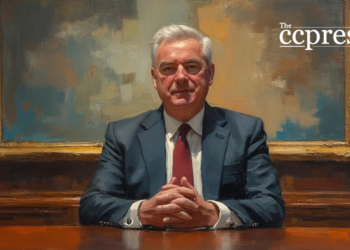Vitalik Buterin Compares Visa’s Roots to DAO Ideals
- Buterin sees Visa’s early days akin to DAO concepts.
- No immediate market reaction followed his remarks.
- Insights prompt discussions on centralized governance.
Vitalik Buterin equates Visa’s foundation with a DAO concept, highlighting its initial focus on shared governance. Over time, Visa evolved into a centralized profit-driven entity, diverging from its chaordic organizational roots introduced by founder Dee Hock.
Vitalik Buterin, co-founder of Ethereum, on August 8, 2025, commented on Visa’s origins, aligning it with the then-developing concept of Decentralized Autonomous Organizations during a public discussion.
Visa’s initial intentions reflect DAO ideals, now seen as centralized. This observation by Buterin prompts reconsideration of governance in blockchain projects.
Buterin stressed that Visa’s original intent shared similarities with the modern Decentralized Autonomous Organization (DAO) concept. He suggested Visa started with a chaordic organizational model, emphasizing shared governance, later evolving into a centralized entity over time.
In his analysis, Buterin highlighted how early projects with community-driven goals can centralize due to efficiency or profit motives. His remarks were aimed at fostering discussions on the evolution of governance structures relevant to blockchain and DeFi.
“Visa’s early model of shared governance highlights what DAOs strive for today, yet serves as a warning of potential pitfalls” – Vitalik Buterin, Co-founder, Ethereum, source
Buterin’s statements had no immediate financial impact or market shifts, as noted; however, the conversation could influence future governance strategies in Web3. While there were no reported changes in ETH prices or DAO-related tokens, the underlying messages may resonate with supporters and critics.
Vitalik Buterin’s comments serve as a critique and reflection on how organizations claiming decentralization might eventually lean toward centralization. His insights into this historical trajectory are instrumental in ongoing debates about organizational governance within the cryptocurrency community. Such observations could catalyze innovative governance models in future decentralization-driven projects.
Disclaimer: The content of this article solely reflects the author's opinion and does not represent the platform in any capacity. This article is not intended to serve as a reference for making investment decisions.
You may also like
The Smarter Web Company Increases Bitcoin Holdings by 50 BTC

Michael Saylor Highlights Bitcoin as Tariff-Free Digital Gold

BlackRock’s Bitcoin Holdings Under Scrutiny Amid Rumors

BlackRock’s Alleged Bitcoin Purchase Unverified
